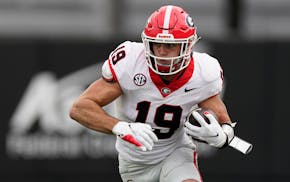As he sat in his stall in the visitors' locker room in Vancouver on Wednesday morning talking about the virtues of the World Junior Championships, Mikko Koivu got interrupted by his road roommate, Nick Schultz.
"I can bring in my ring from the world championships when we beat Finland in the final," the Wild defenseman said.
"No, no, no. We did," the Wild captain snapped.
"What?" said Schultz.
"Yeah, we did," Koivu said. "Last year. We won worlds."
"I wasn't there. I'm talking about when Canada beat you guys," Schultz said. "I'm talking about that time in the world championships when I played in the gold medal game and I won."
"Why don't you bring the medal from Russia? Oh, you don't have any," Koivu yelled back. "We're talking about world junior anyway. You never beat me in world junior. Oh, that's too bad, Hammer. Still bothers you, eh?"
OK, where were we?
As you can see, NHLers are proud of their international hockey, and for good reason. There's something unique about throwing on your nation's crest and playing for your country.
And there's something specifically unique about the World Junior Championships. Maybe it's getting to see tomorrow's NHL stars baby-faced and today. Because of the youthful enthusiasm and immaturity of the best under-20 players in the world, we get to see the dramatic highs and lows that come not only throughout a tournament, but in a single game.
Look no farther than Canada's 6-5 loss to Russia in the semifinals last week in Calgary. The Russians had a 6-1 stranglehold. The Canadians couldn't do anything right, completely lost their minds discipline-wise. But in one of the most exciting periods imaginable, the Canadians roared back in the third period and came within one goal post of sending the game to overtime.
The raucous atmosphere inside the Saddledome rivaled any big game in the States. The passion involved in the World Junior Championships in Canada is like March Madness in the United States, but on a grander scale because it's one nation rooting for one team.
"In Canada growing up as a kid, it's your dream to play in the world juniors," said Schultz, who did so in 2001. "Christmas time, Boxing Day for us, you get up and watch the games. It's a big tradition over the holidays."
It's just what you do in Canada.
"I'd love it to catch on in the States," said Schultz.
Slowly but surely, it seems to be in Minnesota. It started two years ago when Minnesotans Jake Gardiner, Derek Stepan, Danny Kristo, Jordan Schroeder and Mike Lee helped lead the United States to an upset gold over Canada in Saskatchewan.
Unfortunately, the U.S. bowed out early this year, and some interest waned. But fans of the Wild were interested because the team had six prospects partake -- Swedes Johan Larsson, Jonas Brodin and Johan Gustafsson, Finn Mikael Granlund and Americans Jason Zucker and Charlie Coyle.
Larsson, Sweden's captain; Brodin, Sweden's silky smooth-skating defenseman; and Gustafsson, the goalie, helped lead the country to its first world junior gold medal since 1981.
"Unbelievable feeling," said Brodin, the Wild's 2011 first-round draft pick who was scintillating.
"We wanted to win so much," said Larsson, the Wild's 2011 second-rounder who brings immense skill to go along with an even greater work ethic.
"Biggest game of my life," said Gustafsson, the Wild's 2010 sixth-rounder who made the save of his life with 30 seconds left.
In a game in which Sweden held a 39-4 shot advantage over Russia after two periods (remember, this wasn't Sweden-Latvia), Ottawa draft pick Mika Zibanejad, who predicted he would score the overtime winner before overtime, scored on Sweden's 58th shot after a steal and a breakaway for a 1-0 win.
Zibanejad -- a k a the Persian Prince -- is now a national hero, and his last name doesn't even end with "sson" or "berg" or "strom."
"He'll be remembered forever," said Brodin.
So will all the Swedes.
Former Hopkins basketball star transferring from Michigan to U
Chinese Grand Prix could deliver drama to F1 and slow Verstappen's victory march
Rivalries on tap with Barcelona-Chelsea and Lyon-PSG in Women's Champions League semifinals
